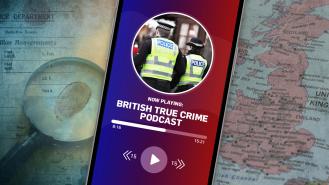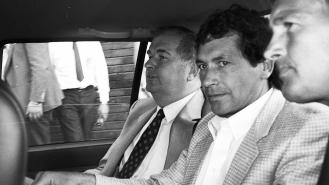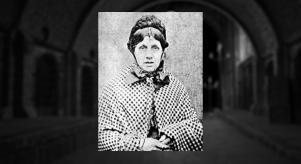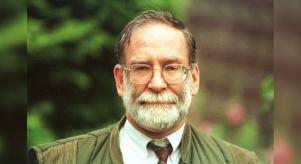
'Brink’s-Mat itself must have cost at least 30 people their lives'
Interview with Wensley Clarkson: Author of The Curse of Brink’s-Mat: 25 Years of Murder and Mayhem
Wensley Clarkson's 2012 book The Curse of Brink’s-Mat: 25 Years of Murder and Mayhem is considered the definitive account of the legendary heist. The 1983 robbery which was dramatised in BBC series, The Gold, left in its wake a long bloody trail of reprisal killings that spanned decades. Seemingly anyone who was connected to the £26 million heist met an untimely and violent end.
With the renewed interest in Brink's-Mat, Crime+Investigation caught up with Wensley to chat about his book and found out why he prefers dealing with criminals to Hollywood celebrities.
Crime+Investigation: Brink’s-Mat was one of the most lucrative heists in history, why do you think it was 'cursed'?
Wensley Clarkson: Everything just went to s**t basically. They looked at it as a simple robbery, but they got so much gold they didn't know what to do with it. When they tried to turn the gold into money, they lost control. So, then they had to introduce these characters who ended up taking more of the gold than they did. This then led to some of the deaths that subsequently occurred.
Were they victims of their success?
It's perceived to be a clever crime. I don't think it's clever. I think it was luck that there was so much gold there. I'm not sure anything about crime is ever a success.
What made you want to write about Brink’s-Mat?
For years after the robbery, no one was connecting the dots on what was happening. That's why I did The Curse of Brink’s-Mat. I was researching all these other subjects and I kept coming across this common theme. I realised that it's like a spider's web. It just keeps spreading. Brink’s-Mat itself must have cost at least 30 people their lives.
Why is Brink’s-Mat so significant in terms of criminal history?
If you compare the amount of money stolen in the Great Train Robbery to the value of the gold in Brink’s-Mat, it's on a different Richter Scale. This is still the biggest gold robbery in the history of crime. It was approximately £26 million in gold in 1983. I'm told that gold is worth over a billion pounds today.
Did the police make any initial mistakes in their investigation?
I think the biggest error was the police's crookedness. Certain policemen in the early '80s were without doubt crooked and had connections to the robbers, particularly Kenneth Noye, who handled some of the gold. It was that corruption which probably led to the inefficiency of the police investigation. Ultimately, the policeman in charge, Brian Boyce, wasn't corrupt in any way, but he was battling it on so many fronts.
Did the robbers make any mistakes?
It's one of the biggest criminal clichés but it was the use of the inside man. One of the guards was the brother-in-law of one of the robbers. When the police heard about the robbery, the first thing they did is look at the staff in the warehouse. That was the biggest mistake of all, but it tells you about the criminal system that still is in existence today.
Criminals don't dream up a crime. They have to hear about something, they have to know someone. In this case, they heard about this warehouse with all this gold and money coming through it regularly and that sparks their decision to commit the robbery. The criminals that never have any connection are obviously the ones who are going to get away with it.
Did you meet any of the robbers?
I had met most of them myself or at least their family members. All the robbers consider themselves professional criminals. Even when it came down to serving that sentence when they were convicted. They took that as being part of their job.
Did the lure of all that money, encourage them to break the criminal code as you say?
There's no honour amongst thieves. Just as every thief I've ever known will say: 'Crime doesn't pay'.
Why is it so difficult to get rid of the gold?
It's an incredibly complex and almost boring process. You have to smelt it down then find new serial numbers, take it out of the country and bring it back in. Then you've got to find someone to buy it.
That's the irony. You know, there's this great adventure of the robbery, but to get their money, they had to go back to basics. It was a turgid process that was long-winded and took them a long time to stand any chance of turning gold into money.
Did anyone escape the 'curse'?
Kenneth Noye. Even though he went to prison, he's still alive. John Palmer is not alive; he was killed by a hitman. As I mentioned, there are several deaths, all linked to Brink’s-Mat and people who paid the ultimate price for their involvement.
I have no doubt there will be more deaths. Even though the perpetrators, the ones who survived, are in their 70s. I believe there will be more.
How much money was recovered?
There were very shady deals done with insurance investigators to try and get some of the gold back in the three or four years following the actual robbery. The most famous apocryphal story is that a third of the gold was never recovered and is buried somewhere.
I think some of the gold is still out there and I sense that [Mick ‘The Nutter’] McAvoy - who is no longer with us - or some of the other robbers felt that they could keep some of the gold buried until they came out. One story that was told to me said some of the robbers finally went to look for the gold and it was gone. I don't think any of the robbers ever ended up enjoying any great wealth, even after they got out of prison,
They were the last generation to believe that they could earn a living out of robbery rather than drugs. It's that switch over from robbery and other traditional crimes to drugs in the ‘80s, particularly, which seems to change the face of the underworld in Britain and probably across most of the world.
You've written a lot about organised crime. What is it that draws you to the subject matter?
Many years ago, I was in LA and I wrote a couple of books about Hollywood stars, and they were a nightmare to write. I discovered dealing with criminals is a lot less stressful than dealing with Hollywood stars and their annoying agents. Criminals have a code and their expectation levels are not as high as a Hollywood star. I've met many criminals, I've been in many prisons, and I would rather deal with them day than deal with a Hollywood actor.
What are you working on now?
I've written several books since the beginning of the lockdown. I'm interested in modern crime, and I did a book on 'The Real Top Boys' which is self-explanatory but that is a different level of crime. I'm constantly evolving my type of books.
What's your favourite true crime podcast?
The best one was West Cork without a doubt. I thought it was stunning. But I think there are too many of them about now. The quality is starting to go down. There's no tick box you can tick to make a good true crime podcast it's really about the production and the people on it more than even the story.
The Curse of Brink’s-Mat: 25 Years of Murder and Mayhem is available at all good bookshops. Find out about Wensley's other books here.









